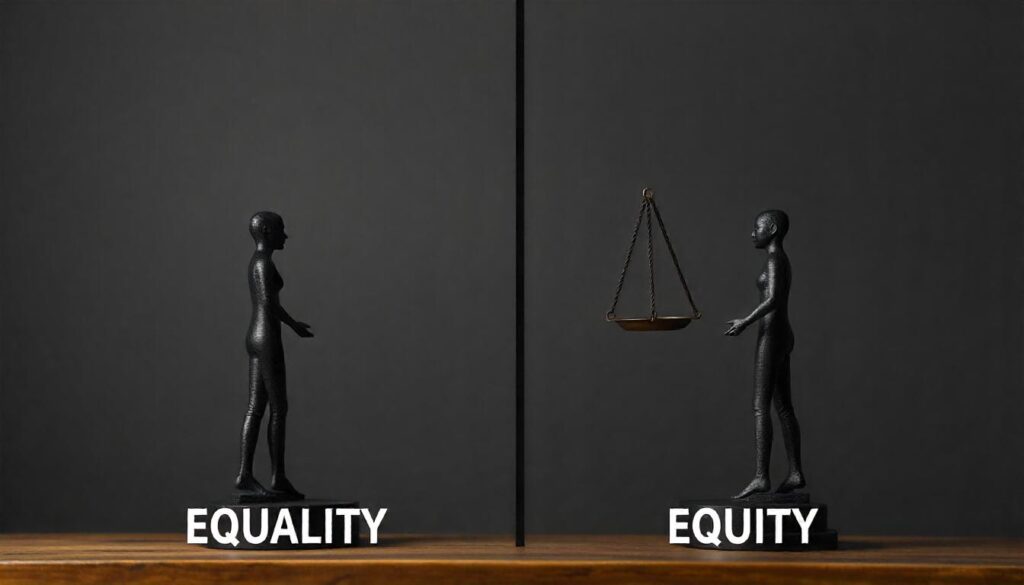This one is for the HR managers out there! When Diversity, Equity, and Inclusion are embedded into a company’s core values, they boost innovation and enhance its reputation. Not only that, the DEI also boosts employee satisfaction, which is the most important aspect to be considered in every organization, among other things. Further in this article, I will discuss why DEI matters and how companies can implement effective strategies to cultivate an inclusive workplace. Let me start first by explaining what diversity, equity, and inclusion mean.
Key Takeaway
- Diversity refers to different demographics, including race, gender, age, ethnicity, disability, and more. It’s about representing a variety of backgrounds, experiences, and voices at the table.
- Equity goes beyond equality by addressing systemic barriers and ensuring fair access to opportunities, resources, and advancement for all employees. While equality aims to treat everybody the same, equity provides everyone with what they need to be successful.
- Inclusion focuses on creating an environment where every individual feels respected, heard, and empowered to contribute fully.
- Diversity in the workplace isn’t just about fairness—it’s a business imperative. Research has consistently shown that diverse teams outperform homogenous ones, as they bring a broader range of perspectives, skills, and innovative ideas.
Breaking Down of the DEI Components

Diversity refers to different demographics, including race, gender, age, ethnicity, disability, and more. It’s about representing a variety of backgrounds, experiences, and voices at the table.
Equity goes beyond equality by addressing systemic barriers and ensuring fair access to opportunities, resources, and advancement for all employees. While equality aims to treat everybody the same, equity provides everyone with what they need to be successful. As an HR personnel/manager, you must never confuse the two.
Inclusion focuses on creating an environment where every individual feels respected, heard, and empowered to contribute fully. Take the following illustration, for example. A mid-sized tech company hires Amaka, a software developer with a visual impairment, as part of its efforts to diversify its workforce. Initially, her teammates struggled to adapt their workflows, unintentionally excluding her from key discussions during meetings because much of the information is shared visually via slides.
Realizing this, the company having inclusion as one of its core values must see to it that:
- The team ensures all meeting materials are screen-reader compatible and provides verbal descriptions of visual content.
- Managers organize a workshop where Amaka shares her experiences, helping the team understand her perspective. This will go a long way to boosting empathy and encouraging open dialogue in the workplace.
- Amaka is given the same opportunities as her peers, including leadership roles on projects, showing that her skills, not her disability, define her contributions.
With the above explanation, I believe I have been able to establish that diversity, equity, and inclusion (DEI) is a practice that recognizes and values differences among employees, ensures fair opportunities for everyone, and fosters a work environment where all feel welcomed and respected. Now is the time to further discuss why it matters and what effective strategies companies should adopt to cultivate an inclusive workplace.
Why Diversity, Equity, and Inclusion Matter in the Workplace.
#1. Diversity
As I said earlier, diversity represents varieties within a given setting. In the workplace, for example, it can mean differences in gender, ethnicity, race, gender identity, sexual orientation, age, and socioeconomic class. It can also refer to differences in physical ability, veteran status, single, married, and whether or not you have kids—all of those are components of diversity.
Here’s Why Diversity Matters
Diversity in the workplace is important because with different backgrounds come different points of view, which oftentimes leads to better ideas and solutions.
Diversity in the workplace isn’t just about fairness—it’s a business imperative. Research has consistently shown that diverse teams outperform homogenous ones, as they bring a broader range of perspectives, skills, and innovative ideas. Pat Wadors, a chief human resources officer and prominent advocate for inclusivity, famously said, “Smart teams will do amazing things, but truly diverse teams will do impossible things.”
Experts also stress the importance of combining diversity with inclusion. Miatta David Johnson, a diversity strategist, noted that “Diversity on its own can only serve optics; inclusion ensures that people’s voices are heard.” This synergy fosters not just better decision-making but also a sense of belonging that drives employee satisfaction and loyalty.
For instance, companies with inclusive cultures are more likely to capture new markets and retain top talent. A study by McKinsey found that organizations in the top quartile for ethnic and cultural diversity on executive teams were 33% more likely to have above-average profitability than those in the bottom quartile
#2. Equity
Equity is the process of ensuring that practices and programs are impartial and fair, providing equal possible outcomes for every employee.

Although they’re often used interchangeably, equality and equity are two distinct concepts. Where equality gives everyone access to the same opportunities, equity in the workplace means that access to opportunities is proportional to each person’s needs and capabilities.
Here’s Why Equity Matters
‘Equity is a cornerstone of a thriving organizational culture. It ensures everyone, regardless of their background, has the opportunity to succeed—Patricia J. Williams. Equity in the workplace is essential for building a culture where all employees have fair access to opportunities, resources, and support. When equity is ingrained in organizational culture, it leads to greater employee satisfaction, engagement, and long-term success.
Williams highlights that equity isn’t just about fairness—it’s about ensuring that all employees, regardless of their background, have the resources and support needed to thrive. This approach fosters a culture where employees feel valued and included, leading to higher engagement and better retention.
Read also: EFFECTIVE EMPLOYEE RETENTION STRATEGIES: Creative Strategies Successful Companies Swear By
Furthermore, embedding equity into a company’s culture boosts employee morale and drives business performance. When employees believe they have equal opportunities to grow and advance, they are more motivated, which translates to improved organizational outcomes.
#3. Inclusion
Inclusion in the workplace ensures that all employees feel valued, respected, and empowered to contribute their unique perspectives, just as in the case of Amak. It is a vital component of organizational culture that drives collaboration, fosters creativity, and enhances overall employee satisfaction.
Here’s Why Inclusion in the Workplace Matters
I really like how Verna Myers put it— “Inclusion is not just about being invited to the party; it’s about being asked to dance.” This simply means that true inclusion goes beyond just having diverse individuals in the room—it’s about making sure they are actively involved and their contributions are valued. When employees feel included, they are more likely to collaborate, share ideas, and contribute creatively, benefiting the organization in general.

Effective Strategies to Cultivate Diversity, Equity, and Inclusion in Organizational Culture
I’ve had my share of experience when it comes to diversity, equity, and inclusion in the workplace. As the newest employee, I easily felt out of place, questioning whether or not I truly belonged. However, thanks to the company I got employed into for their strong core values regarding DEI components. Today, I am the HR manager and I have ensured over the past 3 years as the HR manager that these core values remained stronger.
Here are the strategies that I use and how you can implement them in your own organization:
#1. Develop an inclusive hiring process
One of the ways I have fostered DEI right from the start is through inclusive hiring practices. I introduced what is known as blind recruitment at our company, where we pay less attention to resumes by removing names, genders, and educational institutions focusing purely on skills, experience, and suitability for a role, to prevent conscious or unconscious bias in the hiring process.

To implement this strategy, companies can start by reviewing their hiring processes and tools, using software that anonymizes resumes, and encouraging hiring managers to focus on a candidate’s skills, qualifications, and experience. In addition, offer training on reducing bias during interviews, ensuring all candidates have an equal chance.
#2. Implement DEI training
DEI training has become a foundational part of our workplace culture. I’ve seen firsthand how valuable these sessions can be when they go beyond surface-level discussions and include real-world examples. In our company, we now conduct quarterly DEI workshops that focus on unconscious bias, microaggressions, and inclusive language.

You could do the same in your company. Establish regular DEI training programs that are interactive and engaging. You can start with a session on unconscious bias and gradually cover topics like cultural competency, inclusion in decision-making, and addressing microaggressions. To be effective, this training should be ongoing, not a one-time event, and incorporate feedback to continuously improve the content
#3. Establish a flexible work environment
Drawing from my experience, establishing a flexible work environment has been one of the most effective ways to cultivate and promote inclusivity and employee well-being. At my company, we’ve recognized that every employee has different needs, whether it’s due to caregiving responsibilities, health issues, or just the desire for a better work-life balance. Offering flexible work hours and the option to work remotely have been able to create a more accommodating environment where employees feel trusted and supported. For example, some employees prefer to start their day early, while others are more productive in the afternoon. Giving them the freedom to set their own schedules has positively boosted morale and productivity.
To implement this strategy, companies can begin by offering flexible work schedules that allow employees to adjust their working hours as needed. This might include options like staggered hours, compressed workweeks (e.g., working four 10-hour days instead of five 8-hour days), or hybrid work models where employees can work from home part of the week.
Watch the video below
The company’s leadership should also provide the necessary tools for remote work, such as collaboration software, to ensure that teams can stay connected regardless of where they are working. Implementing these policies helps employees maintain a better work-life balance and demonstrates that the company values their well-being and respects their personal lives
Note: Not all business models require this sort of flexibility. Additionally, clear communication about expectations and deliverables is crucial to ensure flexibility doesn’t result in misunderstandings or decreased productivity.
#4. Establish transparent career advancement pathways
In my experience, creating clear and transparent career growth pathways has been critical for ensuring that employees feel valued and motivated. For instance, in our company, some departments tend to have fewer resources or visibility compared to others. To address this, we established clear criteria for promotions and career progression, ensuring that employees in all teams, regardless of size or focus, had equal opportunities to advance based on merit—talk of equity. We also introduced mentorship programs to guide junior employees in building their careers.
If you want to establish transparent career advancement pathways, start by creating clear guidelines for promotions and career progression, with specific, measurable goals that employees need to achieve. Offer mentorship programs pairing junior staff with experienced colleagues to help them navigate challenges and grow their skills.
Furthermore, conduct performance reviews regularly and provide constructive feedback so employees know what’s expected of them. Finally, make sure managers are trained to identify talent across all departments and advocate for equal growth opportunities.
Frequently Asked Questions on Diversity, Equity, and Inclusion
Are DEI initiatives legally required?
DEI initiatives themselves are not always required, but many aspects, such as nondiscrimination and equal pay, are mandated by labor laws in many countries.
How can companies ensure DEI policies comply with the law?
Companies should consult legal experts to ensure their DEI policies align with employment laws, focusing on fair treatment and avoiding quotas that could lead to legal challenges.
How do cultural differences affect DEI efforts?
Cultural differences may influence how diversity and inclusion are perceived. DEI strategies such as the ones suggested in this article should be adapted to respect local customs and norms while promoting inclusivity.
What is the role of HR managers/company leadership in advancing DEI?
Leaders set the tone for DEI efforts by modeling inclusive behaviors, supporting initiatives, and holding themselves accountable for creating equitable opportunities.
What industries benefit the most from DEI initiatives?
All industries benefit, but customer-facing sectors like retail, tech, and healthcare see immediate advantages because diverse teams better understand diverse markets.
As the HR, how do you address pushback against DEI efforts?
Address pushback by educating employees on the business and ethical benefits of DEI, fostering open dialogue, and highlighting success stories from similar initiatives.
